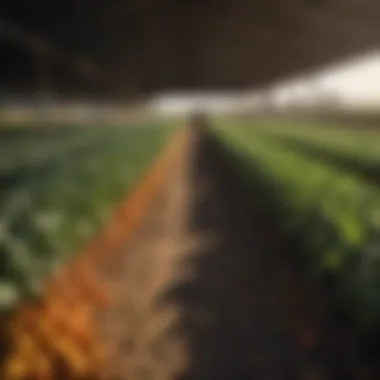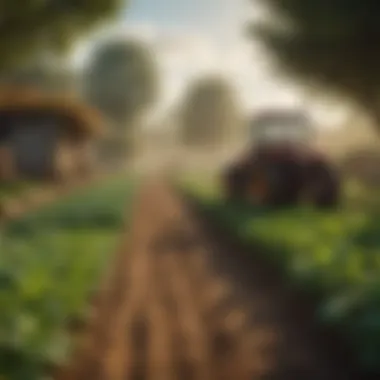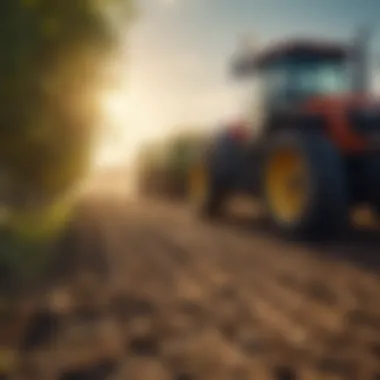Exploring the Impact of Farmer Vectors in Agriculture


Intro
In the landscape of modern agriculture, understanding the role of farmer vectors has become increasingly crucial. These vectors embody not only the physical labor of agricultural workers but also serve as conduits for transferring knowledge, practices, and innovations. As the farming community adapts to meet the demands of a growing global population, the intersection of knowledge transfer, technological advancements, and sustainable practices plays a pivotal role.
Farmers today face diverse challenges, from climate change to pest management. This reality amplifies the need for effective communication and knowledge sharing among farmers. As these farmer vectors navigate complexities within their environments, they contribute significantly to broader goals like food security and environmental sustainability.
In the sections that follow, key trends, essential techniques, and advanced technologies in agriculture will be explored in detail. Each aspect aims to provide insights into how farmers can leverage these elements for improved productivity, sustainability, and innovation. Let's dive into the current trends shaping agriculture and horticulture.
Understanding the Concept of Farmer Vectors
The examination of farmer vectors involves dissecting the complex, but essential, role they play in agriculture today. Understanding this concept is crucial as it informs the reader about both the physical contributions of farmers and their intellectual roles in disseminating agricultural knowledge and practices. Farmer vectors bridge traditional wisdom and modern agricultural techniques, creating a unique synergy that fosters enhanced productivity and sustainability.
Defining the Farmer Vector
A farmer vector embodies more than simply agricultural labor. It represents a conduit for knowledge transfer and innovation in farming practices. This term underscores the importance of human agency in agriculture. Farmers do not just plant seeds; they are active agents, transporting culture, information, and strategies within farming communities. They adapt techniques to meet local conditions, thus enhancing the agricultural landscape.
Historical Context of Farmers in Agriculture
The historical development of agriculture is intertwined with the evolution of farmer roles over centuries. From ancient civilizations that relied on subsistence farming to the current industrialized methods, farmers have been key players. Historically, they have shaped agricultural practices based on experience and environmental considerations. This historical context reveals how farmers have been impacted by socio-economic factors, climate changes, and technological advancements. Understanding these shifts is crucial for recognizing the contemporary farmer vector's position in shaping agricultural policies and practices today.
The Farmer Vector as a Knowledge Carrier
Farmers serve as vital knowledge carriers within agricultural systems. They absorb, adapt, and transmit traditional knowledge, often influenced by generational practices. This knowledge includes understanding local crops, soil types, pest management, and seasonal variations. Furthermore, as the agriculture field evolves, farmers continue to integrate new information, whether through research or peer learning. This dual role cultivates resilience in farming systems and promotes both sustainability and productivity. Their insights are invaluable for improving crop yields and adapting to emerging challenges.
"Farmers are the backbone of agriculture. They not only cultivate the land but also nurture the existing body of knowledge essential for sustainable practices."
By exploring the critical elements of farmer vectors, this section sets the groundwork for further discussions about their role in promoting sustainable practices, integrating innovation, and ensuring food security.
The Role of Farmer Vectors in Sustainable Agriculture
The integration of farmer vectors into sustainable agriculture is crucial for ensuring the viability of food systems and environmental integrity. Farmer vectors act as conduits of knowledge and practices that promote sustainability in farming. They influence how resources are managed, how crops are cultivated, and how communities engage with agriculture. This section will elaborate on various sustainable practices that are driven by farmer vectors, the impacts of traditional knowledge on crop management, and how modern techniques are included by farmers to enhance outputs and sustainability.
Sustainable Practices Promoted by Farmer Vectors
Farmer vectors play a significant role in the promotion of sustainable agricultural practices. They often advocate for methods that preserve the ecosystem, enhance soil health, and improve resource management. Common sustainable practices include:
- Crop Rotation: This practice helps maintain soil fertility and reduces pest and disease buildup.
- Organic Farming: Many farmer vectors promote organic methods which avoid synthetic pesticides and fertilizers. This helps to protect biodiversity.
- Water Conservation Techniques: Methods such as drip irrigation are essential for minimizing water usage while maximizing efficiency.
The sharing of knowledge regarding these practices occurs through various channels, including community workshops, local agricultural networks, and social media platforms. By harnessing both historical practices and current innovations, farmer vectors can significantly reduce the ecological footprint of farming.
Impacts of Traditional Knowledge on Crop Management
Traditional knowledge is an invaluable asset in sustainable agriculture. Farmer vectors often embody this knowledge, which encompasses centuries of practices refined through experience and observation. This wisdom influences crop management strategies in several ways:
- Seed Selection: Farmers often select local varieties that are better adapted to their environment, ensuring higher resilience and better yields.
- Pest Management: Local knowledge about natural pest deterrents reduces reliance on chemical pesticides. Farmers might use intercropping and companion planting as sustainable methods.
- Soil Management: Understanding the local ecosystem allows farmers to implement practices like cover cropping to maintain soil health.


This blend of traditional practices leads to effective resource use and maintains the delicate balance of local ecosystems. Such methods are also celebrated for their adaptability to changing climatic conditions.
Integration of Modern Techniques by Farmers
While traditional practices are important, integrating modern techniques with conventional methods can enhance agricultural sustainability. Farmer vectors are often at the forefront of this integration. They are increasingly adopting technology in ways that supplement their knowledge and practice. Some examples include:
- Precision Agriculture: Farmers leverage data from satellite imagery and sensors to make informed decisions on planting and resource allocation, leading to reduced waste and increased efficiency.
- Mobile Agricultural Applications: Applications help farmers monitor crop growth and market prices. These tools can enhance productivity.
- Biotechnology: Genetically modified crops can offer higher resistance to pests and diseases, reducing the need for chemical inputs.
"Sustainable agriculture is not just a set of practices; it is a way of thinking and operating that integrates community, ecology, and economy."
Ultimately, farmer vectors ensure that sustainability remains at the forefront of agricultural productivity, making them essential players in the quest for food security and environmental stewardship.
Technological Influences on Farmer Vectors
The impact of technology on farmer vectors is profound. It reshapes how knowledge is transferred among farmers and enhances their productivity. As agriculture continues to evolve, understanding these technological influences becomes imperative for future success. This section examines significant trends and their implications for farming practices.
Data-Driven Farming and Farmer Engagement
Data-driven farming incorporates the use of technology to gather, analyze, and utilize data for better decision-making. This approach helps farmers understand their fields in detail. Better insights lead to improved crop yields and efficient resource management.
Farmers now engage with various data sources. These include weather forecasts, soil moisture levels, and historical yield data. With mobile applications, farmers are able to access real-time information instantly. This engagement allows for a more informed decision-making process. Farmers using data-driven techniques can shift from reactive to proactive farming practices.
Furthermore, the interaction with data fosters a deeper engagement among farmer communities. Sharing data insights can lead to collective improvements in practices. They can learn from each other, adapting successful strategies and methodologies suitable for their environments.
Adoption of Precision Agriculture
Precision agriculture is revolutionizing farming methods. This technology relies on data and GPS systems to manage field variability in crops. Farmers can apply resources more efficiently, ensuring optimal growth conditions for crops.
With tools like soil sensors and satellite imagery, farmers can monitor crop health accurately. This minimizes waste and enhances productivity. Crops receive the exact amount of water, nutrients, and pesticides they need. In turn, this leads to healthier plants and higher profits.
Moreover, precision farming impacts sustainability. Reducing chemical use has a positive effect on the environment. Less runoff means clearer waterways and healthier ecosystems. The integration of precision agriculture represents a shift towards sustainable and responsible farming practices.
The Role of Drones in Modern Farming
Drones are emerging as significant tools in agriculture. They are used for a variety of purposes, including monitoring crop growth, assessing field health, and planning irrigation strategies. Drones provide a bird's-eye view of the fields. This perspective allows farmers to identify issues that may not be visible from the ground.
These unmanned aerial vehicles can collect data quickly and efficiently. This efficiency means farmers can make timely interventions. For instance, if a farmer detects a disease outbreak in a crop, they can respond immediately, preventing further loss.
Additionally, drones enhance data collection for precision agriculture. They can map out soil quality and moisture levels. This use of aerial data contributes to smarter resource management. The role of drones exemplifies how technology can facilitate a productive relationship between farmer vectors and their environment.
In summary, the technological influences on farmer vectors are reshaping agricultural practices. Data-driven farming, precision agriculture, and the deployment of drones are key elements that improve productivity and sustainability. As farmers adapt to these advancements, the future of agriculture looks promising.
Farmer Vectors and Food Security
The interplay between farmer vectors and food security is critical in maintaining a sustainable agricultural system. As the global population continues to grow, the demand for food increases, putting immense pressure on farmers to improve production while ensuring that food systems remain sustainable. Farmer vectors facilitate this process by bridging the knowledge gap between traditional practices and innovative agricultural methods. They are pivotal in addressing key issues in food security, including challenges posed by climate change, economic instability, and an ever-changing agricultural landscape.
Challenges Facing Farmers Today


Farmers face a variety of challenges that directly impact food security. Some of these challenges include:
- Climate Change: Unpredictable weather patterns cause uncertainty in crop yields. Extreme weather events can devastate harvests, making it difficult for farmers to maintain consistent production levels.
- Economic Pressures: Fluctuating market prices can hinder farmers' ability to invest in better technologies or farming practices. This can lead to decreased productivity, limiting the supply of food.
- Resource Scarcity: Access to water, soil health, and land availability are major factors. Overexploitation of natural resources can lead to diminished yields and increased competition among farmers.
Addressing these challenges requires farmer vectors to adapt, innovate, and collaborate. By sharing knowledge and coping strategies, farmers can develop resilience against these pressures.
Farmer Vectors and Global Supply Chains
Farmer vectors play a significant role in global supply chains. They connect local farmers to larger markets, ensuring that food reaches consumers effectively. This connection enhances food security by:
- Enabling Access to Markets: Through better distribution channels, farmers can reach broader audiences.
- Promoting Quality Control: Farmers can maintain higher standards when they are knowledgeable about supply chain requirements.
- Supporting Sustainability: Farmers can share local practices that benefit a global audience, thus improving food quality and traceability.
The integration of local farming practices with global supply networks can strengthen food security in multiple regions, reducing disparities in access to fresh produce.
The Importance of Local Food Systems
Local food systems are essential for enhancing food security and resilience. They allow communities to develop their food systems based on local resources and practices. Some benefits include:
- Reduced Transportation Costs: Local systems emphasize short supply chains, minimizing transportation costs and emissions.
- Fresh Produce: Consumers gain access to fresher produce, with better taste and nutritional value.
- Community Engagement: Local systems foster a sense of community among farmers and consumers, emphasizing the importance of supporting local agriculture.
In essence, local food systems enable farmer vectors to ensure that food is not only available but affordable and nutritious. This reduces reliance on industrial agriculture and promotes self-sufficiency among communities.
"Farmer vectors are not just providers of food; they are custodians of knowledge, sustainability, and community well-being."
Educational Outreach and the Role of Farmer Vectors
Educational outreach is a crucial aspect when discussing the role of farmer vectors in agriculture. It involves the transfer of knowledge and practical skills necessary for modern farming. This outreach particularly enhances the effectiveness and sustainability of farming practices. Furthermore, it ensures that farmers are well informed about the latest advancements in agricultural techniques and technologies.
Farmers, as vectors of knowledge, can share traditional practices and innovations. This sharing doesn't only improve yield but also fosters resilience against climate change and market fluctuations. Without strong outreach, many farmers may miss vital information and support, which can impact their productivity and, ultimately, the food supply system.
Extension Services and Their Impact
Extension services play a significant role in educational outreach. These services facilitate the exchange of information between farmers and agricultural experts. They act as a bridge, helping farmers learn efficient methods and best practices tailored to their unique circumstances.
The benefits of extension services are evident. They can introduce farmers to new pest control methods, soil management practices, and crop varieties that are more suited to local conditions. Extension agents often conduct workshops and demonstrations, making learning engaging and practical. Notably, this hands-on approach helps in building trust and rapport between farmers and agricultural experts.
Moreover, extension services can address specific local concerns such as water management and sustainable land use. This targeted support empowers farmers, enabling them to make informed decisions that positively impact their operations. The overall effect enhances their role as farmer vectors, reinforcing their position as carriers of knowledge within their communities.
The Role of Agricultural Education Institutions
Agricultural education institutions are pivotal in shaping future generations of farmer vectors. They provide formal education and training in various agricultural disciplines. Programs at universities and colleges often include degrees in agronomy, animal science, and agricultural business.
These institutions not only educate students but also engage in research that addresses contemporary agricultural challenges. Research findings can be shared with farmers, ensuring that they benefit from the latest scientific advancements. Partnerships with local farms for practical training also create a valuable link between theory and practice, reinforcing the learning process.
Furthermore, outreach initiatives from these institutions can benefit the wider farming community. Workshops, community seminars, and online resources broaden access to knowledge. They serve as platforms for sharing both innovative techniques and traditional farming wisdom. By enhancing farmer skills through targeted education, these institutions help to sustain and develop farmer vectors in agriculture.
Peer-Learning Among Farmers


Peer-learning is an effective method employed in agricultural education. When farmers learn from one another, they often find solutions that are applicable in their real-world situations. This informal type of knowledge transfer values the experiences each farmer brings. Peer-learning also fosters a sense of community, allowing farmers to network and support each other.
In many regions, farmer groups and cooperatives are formed to facilitate this process. These groups often organize study circles or shared learning sessions where members discuss challenges and share strategies. Through farmers’ insights, traditional knowledge can be preserved and blended with new agricultural techniques.
"The combination of peer-learning and formal education creates a powerful knowledge network that supports the evolution of farming practices."
The Future of Farmer Vectors in Agriculture
The landscape of agriculture is continuously changing. As we look ahead, it is essential to understand the evolving role of farmer vectors. Farmer vectors symbolize the connection between personal experience and broader agricultural trends. Their involvement not only shapes farming practices but also influences food security and environmental sustainability. Key elements in this future will include evolving practices, technological innovations, and the integration of new generations of farmers.
Anticipated Trends in Farming Practices
Farming practices are shifting due to various factors. One significant trend is the move towards regenerative agriculture. This approach prioritizes soil health, biodiversity, and ecosystem resilience. Farmer vectors will play a crucial role in adopting and promoting these sustainable methods. The use of crop rotation and cover cropping may become more common. Moreover, farmers will increasingly collaborate with each other to share knowledge about these practices. As communities come together, they will shape future farming techniques.
Additionally, the global demand for organic produce is rising. Farmers will need to adapt their practices to meet this demand. This includes understanding organic certifications, pest management, and soil fertility.
"Sustainability is not a trend; it's a responsibility that must be embraced by the new generations of farmers."
Technological Innovations on the Horizon
Technology is transforming agriculture. The integration of advanced technologies will influence the role of farmer vectors significantly. Precision agriculture, which utilizes data from satellites, drones, and sensors, offers great potential. This technology enables farmers to monitor soil conditions and crop health more effectively. Consequently, farmer vectors must be well-informed about these tools to maximize their benefits.
Moreover, the advent of Artificial Intelligence (AI) holds promise. AI can assist in decision-making processes, improving yield forecasts and management strategies. Farmers who embrace these innovations can enhance productivity.
Emerging Roles for New Generations of Farmers
As older farmers retire, new generations are stepping into the field. These young farmers bring fresh perspectives and a tech-savvy approach to agriculture. They will focus more on sustainability and innovative practices. The emerging roles include entrepreneurs who engage in community-supported agriculture (CSA). They also leverage social media platforms to connect with consumers.
The new generation is also more sensitive to climate change issues. They will advocate for practices that reduce carbon footprints and conserve resources. The future of farming will thus be marked by their commitment to these principles.
Closure and Implications
The conclusion and implications section serves as a critical synthesizing point in the exploration of farmer vectors. It encapsulates the essential insights gathered throughout the article, reinforcing the importance of understanding the multifaceted roles that farmer vectors play in agriculture. As knowledge carriers, they not only sustain agricultural practices but also drive innovation in methods that can lead to increased productivity and sustainability.
Understanding the role of farmer vectors helps acknowledge the deep connection between farming communities and the ecosystems they depend on. They embody a wealth of traditional knowledge while adapting to and integrating modern technologies. This transition impacts food security, conservation of practices, and the overall ecological balance. A well-rounded comprehension of these elements allows for more informed decision-making within agricultural policies, thus paving the way for future advancements.
Summarizing Key Insights on Farmer Vectors
To summarize, farmer vectors are pivotal in shaping the agricultural landscape. Their influence can be distilled into several key insights:
- Knowledge Transfer: Farmer vectors facilitate the continuous exchange of knowledge, ensuring that agricultural wisdom is not lost over generations.
- Sustainable Practices: They contribute significantly to sustainable agriculture by implementing practices that minimize environmental impact, such as crop rotation and organic farming.
- Technological Integration: They are at the forefront of adopting new technologies like precision agriculture and data-driven farming, which enhance productivity and efficiency.
- Food Security: Farmer vectors directly influence local and global food security by addressing specific community needs and global market trends.
"The role of farmer vectors extends beyond simple labor; they shape the future of sustainable agriculture."
Recognizing these insights is vital for appreciating the agricultural ecosystem's complexity.
Recommendations for Future Research
Future research is essential to enhance our understanding of farmer vectors and their evolving role in agriculture. The following recommendations may guide new studies:
- Interdisciplinary Approach: Explore collaborations between agricultural sciences, environmental studies, and social sciences to gain a holistic view of farmer vectors' impact.
- Impact of Technology: Investigate how emerging technologies influence farmer vectors, particularly in developing nations, to identify best practices that could be globally applicable.
- Policy Analysis: Assess current agricultural policies and their alignment with the contributions of farmer vectors, aiming to create more equity in resource distribution and educational outreach.
- Longitudinal Studies: Conduct studies to track the long-term impact of farmer vectors on sustainability practices and food security in diverse agricultural contexts.
By focusing on these areas, the research can further illuminate the invaluable roles that farmer vectors play, ultimately contributing to more effective agricultural systems and food security for future generations.



